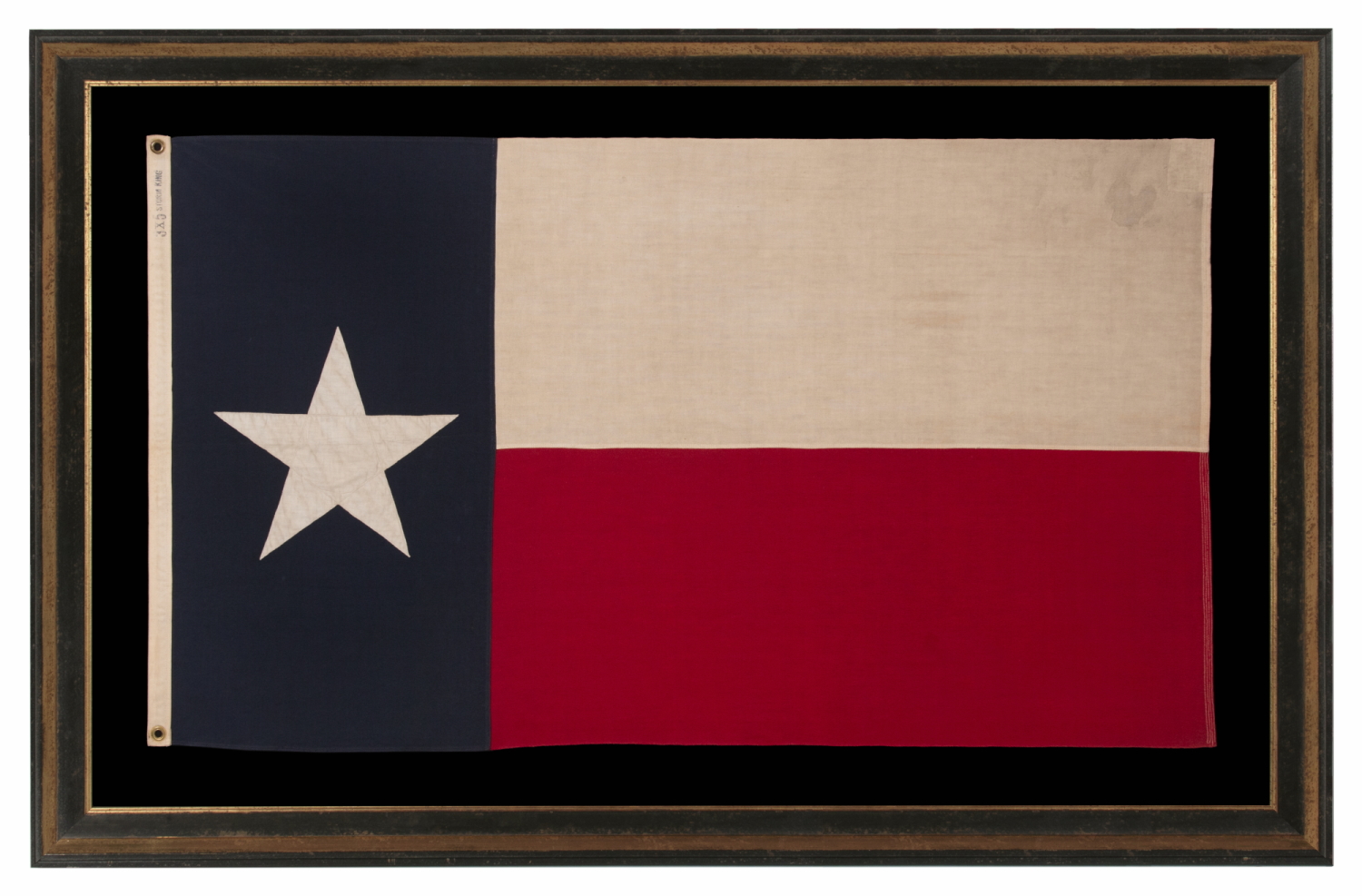
| |
FLAG OF THE REPUBLIC OF TEXAS, WHICH BECAME THE TEXAS STATE FLAG, MADE CIRCA 1945 – 1950’s |
|
| Available: |
Sold |
| Frame Size (H x L): |
Approx. 45.5" x 70" |
| Flag Size (H x L): |
33.5" x 57.75" |
|
| Description....: |
|
Texas State flag, made sometime in the period between the latter 1940’s and the 1950’s. The single star is made of cotton and is double-appliquéd (applied to both sides) with a zigzag machine stitch. The vertical bar and the two horizontal bars are pieced and joined with lineal machine stitching. There is a canvas binding along the hoist with two brass grommets, along which, near the top, on the obverse, “3 x 5” is stamped, to indicate size in feet, followed by the words “Storm King.” This is a brand name, used by the maker to indicate the grade of fabric and construction within the examples that it made. Because the same title was used by a wide range of flag-makers, it isn’t possible to identify the maker from this verbiage alone.
Early examples of the Flag of the Republic of Texas, which was to eventually become its flag as a state, are surprisingly scarce. Even among flags dating to early-mid 20th century, extremely few survive.
Brief History of the Flag of the Republic of Texas / Texas State Flag:
Although its designer remains unknown, a flag in this general design was introduced to the Congress of the Republic of Texas on December 28, 1838. Presented by Senator William H. Wharton, it was adopted on January 25, 1839 as the final of several national flag designs used to represent the Republic of Texas, when it was a nation unto itself. A man by the name of Dr. Charles B. Stewart is credited with the drawing, accepted by the Third Congress of the Republic, when it enacted the legislation through which the flag was officially adopted.
Use of one "Lone Star" in Texas symbolized its solidarity in declaring independence from Mexico. A single, large star appeared on what is known as the "Burnet Flag," which served as the national flag of the Republic of Texas from 1836 until 1839. It also appeared on the flags designed by Stephen F. Austin in 1835 and Lorenzo de Zavala in 1836, the latter of which was allegedly adopted in the Convention of 1836 at Washington-on-the-Brazos. It is of interest to note that flag historians also cite the use of a single, large star decades beforehand, in The Republic of West Florida, which existed in 1810 for a period of just over two and a half months.
It is also of interest to note that during the Civil War, the State Flag of Texas was sometimes married with that of the First Confederate National Flag (a.k.a., the Stars & Bars). The latter was very similar to the flag of Texas, instead displaying a blue canton in the upper, hoist-end corner, similar to the Stars & Stripes, on which there were a number of white stars to represent the count of Confederate States at any particular time. This grew as more states were accepted to the Confederacy. The canton was paired with a field of three horizontal bars, in red-white-red. Texas patriotism during the war sometimes led to the combination of the two flags, via the use of just one lone star on a flag in the First National design. Close variants of this can also be encountered.
Although design of the Flag of the Republic of Texas remained the de facto state flag from 1879 - 1933, there was technically no official state flag during this period. This is because, in 1879, all statutes not explicitly renewed by the state were repealed under something called the "Revised Civil Statutes of 1879." Since the statutes pertaining to the flag were not among those renewed in that year, Texas was formally flagless until the passage Texas Flag Code in 1933.
Mounting: The flag was mounted and framed within our own conservation department, which is led by expert trained staff. We take great care in the mounting and preservation of flags and have framed thousands of examples.
The background is 100% cotton twill, black in color, that has been washed and treated for colorfastness. The black-painted and hand-gilded and distressed molding is Italian. The glazing is U.V. protective plexiglass. Feel free to contact us for more details.
Condition: There is very minor soiling along the hoist end and in the star, accompanied by modest to moderate staining in the white bar, especially toward the fly end. There is some fabric loss in the top, fly end corner. Fabric of similar coloration was placed behind this area, during the mounting process for masking purposes. Many of my clients like vintage flags to show their age and history of use. |
|
|
|
| Collector Level: |
Beginners and Holiday Gift Giving |
|
| Flag Type: |
Sewn flag |
|
| Star Count: |
|
|
| Earliest Date of Origin: |
1945 |
|
| Latest Date of Origin: |
1950's |
|
| State/Affiliation: |
Texas |
|
| War Association: |
|
|
| Price: |
SOLD |
|
| |
Views: 1917 |
|
|
|

